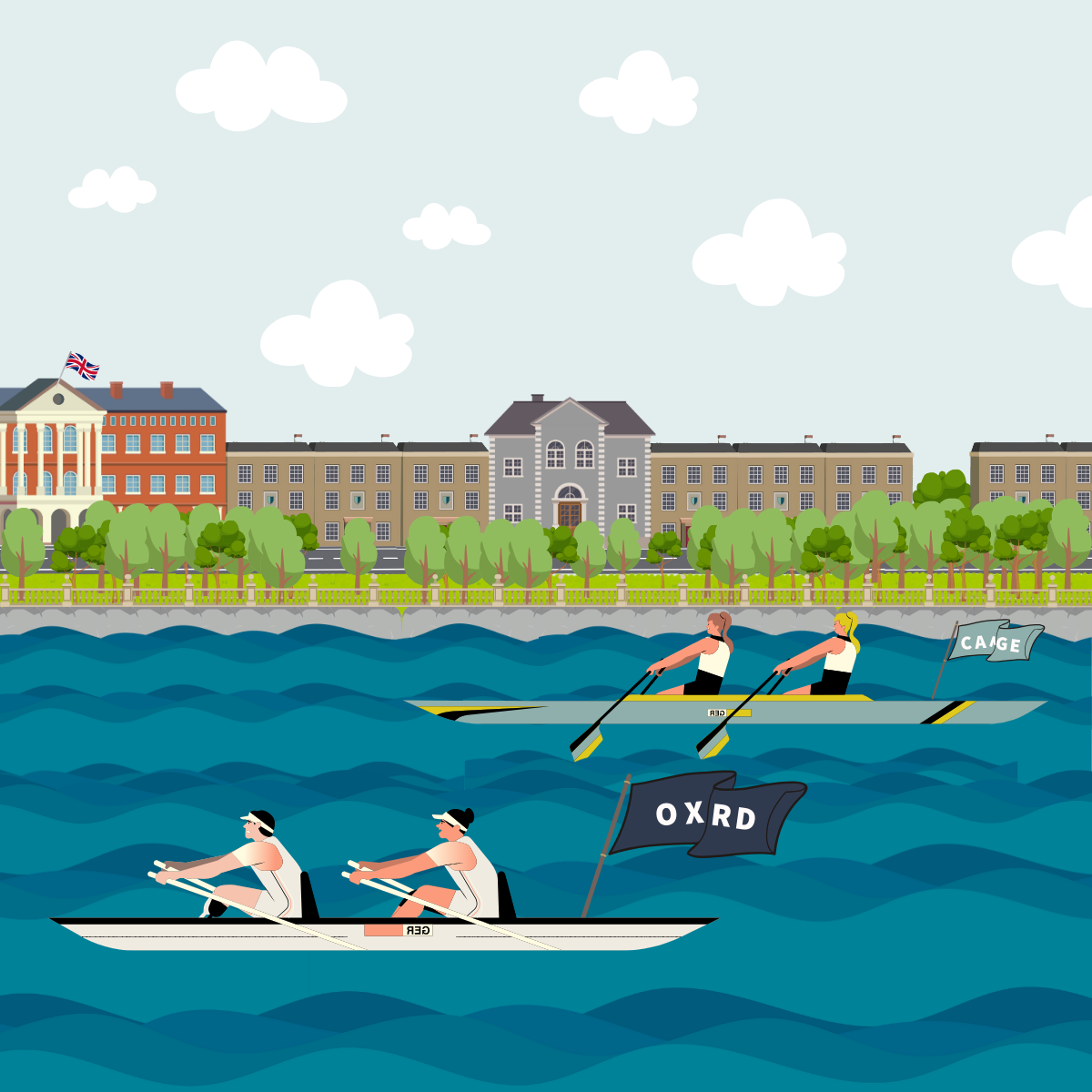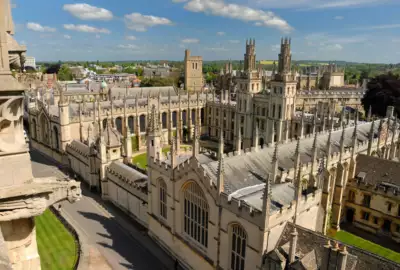Expert Insights
Oxford vs Cambridge: Which University to Pick?
Published 27th June 2025 by Alastair

Oxford vs Cambridge: Which University to Pick in 2025?
The two most prestigious and renowned British universities are so synonymous they even have a portmanteau: Oxbridge. Like Jack and Jill or salt and pepper, Oxford and Cambridge are words that go together.
So, what's the difference? In this article, we will help clarify the similarities and differences between Oxford and Cambridge and, if you are a prospective student, help you with your application decision.
Choosing between Oxford and Cambridge, two of the world's oldest and most prestigious universities, can be a challenging decision. Both institutions boast rich histories, long-standing traditions, and stellar global reputations, making them dream destinations for students worldwide. Selecting the right university is crucial for a student's academic and personal development. It shapes their educational journey, career prospects, and life experiences. The decision between Oxford and Cambridge is about academic excellence and finding the right fit for one's interests, aspirations, and lifestyle.
| Aspect | Oxford | Cambridge | Source |
|---|---|---|---|
| Founded | 1096 (teaching existed); formally organised by 1249 | 1209 | Oxford History / Cambridge History |
| Number of Colleges | 39 colleges + 6 permanent private halls | 31 colleges | Oxford Colleges / Cambridge Colleges |
| Teaching Style | Tutorials: intensive 1–2 student sessions with tutors | Supervisions: similar small-group teaching | Oxford Tutorials / Cambridge Supervisions |
| Entry Requirements (Standard Offer) | AAA–A*A*A depending on course | A*A*A for sciences; A*AA–A*A*A for arts/humanities | Oxford Entry Requirements / Cambridge Entry Requirements |
| Acceptance Rate | ~14–17% overall | ~16–19% overall | Oxford Admissions Stats / Cambridge Admissions Stats |
| Number of Students (2023) | ~26,500 total | ~24,500 total | Oxford Facts & Figures / Cambridge Student Numbers |
| Top QS World Ranking (2024) | #3 globally | #2 globally | QS World Rankings 2024 |
| Famous Alumni | Tim Berners-Lee (Inventor of the World Wide Web), T.S. Eliot, J.R.R. Tolkien |
Isaac Newton, Charles Darwin, Stephen Hawking, Alan Turing | Oxford Alumni / Cambridge Alumni |
| City Size & Atmosphere | Larger city, urbanised centre with historical areas | Smaller city, compact, strong campus-town feel | Oxford City Guide / Visit Cambridge |
| International Students % | ~45% | ~40% | Oxford Facts & Figures / Cambridge International Students |
Oxford
Oxford University, established in the late 12th century, is the oldest university in the English-speaking world. Its history is intertwined with the city of Oxford, with the university playing a central role in its development. The university grew rapidly from the 13th century, establishing its early reputation through significant events, including founding the first colleges such as University College, Balliol, and Merton.
Cambridge
Cambridge University, founded in 1209 by scholars fleeing hostile townspeople in Oxford, quickly established itself as a leading academic institution. The university's early development was marked by establishing its first college, Peterhouse, in 1284. Over the centuries, Cambridge expanded its influence, particularly in the sciences, contributing to significant advancements during the Renaissance and beyond.

Oxford
Oxford's notable alumni include 28 British Prime Ministers, such as Margaret Thatcher and Tony Blair, as well as renowned writers like J.R.R. Tolkien and Oscar Wilde. In the sciences, Oxford counts Nobel laureates such as Sir Peter Medawar and Dorothy Hodgkin among its alumni.
Cambridge
Cambridge's alumni list is equally illustrious, featuring iconic figures such as Sir Isaac Newton, whose laws of motion laid the foundation for classical mechanics, Charles Darwin, the father of evolutionary theory, and Alan Turing, famous for his work developing the first modern computers and decoding the encryption of German Enigma machines during the second world war. Cambridge has also produced 121 Nobel Prize winners, more than any other institution, with luminaries like physicist Stephen Hawking and biochemist Frederick Sanger contributing to its storied legacy.
Both universities are consistently ranked among the top in global university rankings. Oxford frequently appears in the top five of the QS World University Rankings and the Times Higher Education World University Rankings. Its reputation for academic excellence, innovative research, and influential alumni contributes to its high standing.
Cambridge also ranks highly, often neck-and-neck with Oxford in global rankings. It is renowned for its rigorous academic programs, particularly in the sciences and engineering. Cambridge's emphasis on research and its numerous Nobel laureates underscore its global prestige and academic influence.
In this system, the universities are composed of several colleges, each functioning as an independent entity within the larger university framework. These colleges provide accommodation, dining facilities, and social spaces, focusing on students' social and academic lives.
Each college is responsible for admitting students and providing tutorial support. This system allows for a close-knit community feel, as students receive personalised attention from tutors and have opportunities to engage in small-group learning. Colleges also host various events and activities, fostering a strong sense of community and tradition.
Oxford
Oxford's 43 colleges, including Magdalen, Christ Church, and All Souls, are renowned for their historic buildings and picturesque settings. Each college has its own unique history, character, and traditions. Thirty-six of these colleges are independent and self-governing, and most colleges offer meals, libraries, accommodation, sports, events, and opportunities that help flesh out a student's time there and help them feel at home.
Here's a full list of Oxford's 43 colleges.
Cambridge
Cambridge has fewer colleges, totalling 31. While Cambridge is a smaller institution, it is equally, very marginally, less competitive, as fewer people apply each year than its admittedly slightly more famous counterpart, Oxford. Cambridge's colleges, including Trinity, St. John's, and King's, are equally prestigious, with beautiful architecture and rich histories. Some are more famous than others, such as Trinity College, which has produced more Nobel Prize winners than any other college at Cambridge. But all colleges at Cambridge, while equally valued, vary in size and specialisation, providing diverse options for students based on their academic interests and preferences.
Here's a full list of Cambridge's 31 Colleges
Both universities offer a wide range of undergraduate and postgraduate courses across various disciplines. Oxford is known for its humanities programs, with strong classics, philosophy, and English literature departments. It also has a robust social sciences faculty, excelling in law, politics, and economics.
Cambridge, on the other hand, strongly emphasizes the sciences and engineering. Its Natural Sciences program is particularly renowned, offering a broad foundation in biological and physical sciences before allowing students to specialise. Cambridge also excels in mathematics, with its rigorous Tripos program producing many famous mathematicians.

Entry into both universities is highly competitive, with stringent academic requirements. For Oxford, typical offers are A* A A at A-level or 38-40 points in the International Baccalaureate, with specific subject requirements depending on the course.
Cambridge also requires high grades, typically A* A* A or A* A A at A-level and 40-42 points in the International Baccalaureate, with higher-level subjects specified for each course.
We go more in-depth on entry requirements in our guide: What is Oxbridge?
Oxford's admissions tests, such as the TSA, MAT, and LNAT, are designed to assess a candidate's aptitude for the chosen course. Cambridge requires tests like the STEP, and CPSQ. While they used to hold tests such as the BMAT and others, these have been discontinued as of 2024. You can find out more information about testing for Cambridge here.
Both universities also conduct interviews as part of the selection process. These interviews assess the applicant's academic potential and suitability for the chosen course. The interview process can be rigorous, often involving problem-solving tasks and discussions on academic topics.
International students applying to Oxford and Cambridge must meet additional requirements. These often include demonstrating proficiency in English through tests such as IELTS or TOEFL. Both universities provide detailed information on their websites about the specific language requirements and other criteria for international applicants:
Both Oxford and Cambridge are among the top global universities for Law, but they differ in approach:
Oxford offers the BA in Jurisprudence, a rigorous course focusing heavily on legal theory and philosophy, with an optional year abroad for European & International Law.
Cambridge offers the BA in Law, focusing on black-letter law with options to specialise in areas such as international law or criminology in final years.
Graduate outcomes: Both place graduates into Magic Circle firms, top chambers, and academia. Oxford’s tutorial system is renowned for its emphasis on legal reasoning, while Cambridge’s supervision approach similarly prepares students for practice and research.
Sources:
Both Oxford and Cambridge are among the top global universities for Medicine, but their course structures differ:
Oxford offers a 6-year programme split into pre-clinical (3 years, highly theoretical) and clinical (3 years, hospital-based) stages. It has a strong emphasis on biomedical sciences and research preparation before patient contact.
Cambridge offers a similar 6-year programme with earlier patient exposure and broader intercalation options such as Natural Sciences, Psychology, and Management Studies in the third year.
Graduate outcomes: Both produce highly competitive doctors. Cambridge’s flexibility in intercalation attracts students interested in academic research careers.
Sources:
Both Oxford and Cambridge are among the top global universities for Economics, but they differ in structure and focus:
Oxford does not offer a standalone Economics BA; instead:
Philosophy, Politics and Economics (PPE) – interdisciplinary with politics and philosophy.
Economics & Management (E&M) – combines economics with business and management modules.
Cambridge offers a pure Economics BA, highly quantitative and theoretical, covering advanced microeconomics, macroeconomics, and econometrics from first year.
Graduate outcomes: Cambridge Economics graduates often go into finance, consultancy, or academia due to its rigorous quantitative training. Oxford PPE graduates often pursue public policy, journalism, and politics, while E&M graduates excel in management consultancy and finance.
Sources:
Both Oxford and Cambridge are among the top global universities for Computer Science, but they differ in emphasis:
Oxford offers Computer Science (BA or Master’s) or joint degrees with Philosophy or Maths. The course is strong in theoretical computer science, algorithms, AI, and verification, with coursework closely integrated with the Mathematical Institute.
Cambridge offers a Computer Science BA (can convert to Master’s in the fourth year). It covers hardware, software, AI, security, and allows specialisation in later years, including quantum computing and machine learning.
Graduate outcomes: Both produce highly employable graduates entering tech giants, quantitative finance, and academia. Cambridge includes compulsory hardware modules in the first year, while Oxford is more theoretical and mathematical throughout.
Sources:
QS Computer Science Rankings 2024
Oxford and Cambridge offer extensive academic support to help students succeed. At Oxford, academic advisors and tutors provide personalised guidance, and the university offers numerous study resources, including world-class libraries and research facilities. Cambridge also provides robust academic support, with supervision sessions allowing students to receive detailed feedback on their work.
Both universities prioritise student well-being and offer comprehensive health services. Oxford's services include counselling, mental health support, and medical care provided by the university's health centre. Cambridge offers similar services, with the University Counselling Service providing support for mental health issues and various well-being programs to promote a healthy student life.
Financial aid is available at both universities to help students manage their expenses. Oxford offers a range of scholarships, bursaries, and grants, including the Oxford Bursary and Crankstart Scholarship for UK students. Cambridge provides financial support through schemes like the Cambridge Bursary Scheme and various college-specific awards. Both universities aim to ensure that financial constraints do not prevent talented students from attending.
Just as Oxford and Cambridge offer support services at their respective universities, Ivy Education can support your journey to Oxford or Cambridge with our experienced Oxbridge tutors. Our tailored tutoring programs are designed to help you excel in admissions tests, interviews, and overall preparation. Visit our Oxbridge tuition page for more details and to get started.
Oxford and Cambridge graduates are highly sought after by employers worldwide. Oxford boasts impressive graduate employment rates, with many students securing positions in top companies and organisations. Cambridge graduates also enjoy strong employment prospects, with high rates of employment in various sectors, including technology, finance, and academia.
Oxford
The University of Oxford offers extensive careers and alumni support
to enhance the prospects of its graduates. According to the most recent
Graduate Outcomes Survey, almost 80% of Oxford's research graduates are
in paid employment, with the majority finding roles in education,
research and development, or health industries. The university's Careers
Service provides personalised advice, access to over 12,000 job
vacancies annually, and numerous skills workshops and employer events.
Alumni can benefit from ongoing support, including career fairs, job
postings, and networking opportunities.
Oxford's career services are designed to cater to a diverse range of student needs. The CareerConnect platform is exclusive to Oxford students and alumni, offering thousands of job vacancies each year. Oxford's numerous career fairs, including sector-specific ones like the Law Fair and Science, Technology, and Engineering Fair, allow students to connect with top employers. The university also supports entrepreneurship through the Oxford Foundry, providing resources and mentorship for students looking to start their own businesses.
Here's a table showing key statistics from Oxford's own Graduate Outcomes Survey:
| Key Statistics from Graduate Outcomes - Oxford | Percentage |
|---|---|
| Paid work for an employer | 79.6% |
| Engaging in further study or research | 6.1% |
| Unemployed and looking for work | 2.6% |
| Self-employment/freelancing | 2.6% |
| Average annual salary | £41,600 |
| Median annual salary | £35,700 |
Cambridge
Just like Oxford, according to the data, a significant percentage of graduates secure employment or engage in further studies shortly after completing their programs. The university supports students through various career services, including job fairs, internships, and networking events. These resources ensure that graduates are well-prepared for their professional journeys, contributing to the high employment rates and average salaries reported.
Cambridge's commitment to student success is evident in the detailed graduate outcomes data, which showcases its alumni's diverse career paths and achievements. The university's career services provide ongoing support through workshops, counselling, and access to exclusive job postings. This comprehensive support system helps students transition smoothly into the workforce and fosters long-term career growth and development, enhancing the overall value of a Cambridge education.
Here's the table showing key statistics from Cambridge's Graduate Outcomes Survey:
| Key Statistics from Graduate Outcomes - Cambridge | Percentage |
|---|---|
| Paid work for an employer | 82.7% |
| Engaging in further study or research | 7.9% |
| Unemployed and looking for work | 3.4% |
| Self-employment/freelancing | 3.2% |
| Average annual salary | £42,200 |
| Median annual salary | £36,500 |
Both universities offer extensive career services to support students in their job search. Oxford's Careers Service CareerConnect provides resources such as job fairs, internships, and career counselling. Cambridge's Careers Service, Handshake Careers, offers similar support, including workshops, networking events, and personalised career advice.
The strength of the alumni network at both universities is a significant advantage for students. Oxford's alumni network includes influential figures in various fields, providing valuable connections and mentorship opportunities. Cambridge's alumni network is equally powerful, with strong ties to industry leaders and academic institutions globally.
The cost of attending Oxford and Cambridge includes tuition fees and living expenses. Tuition fees for undergraduate students from the UK are currently capped at £9,250 per year, while international students may face higher fees depending on the course. Living expenses, including accommodation, food, and personal costs, can vary significantly between students but are generally similar for both universities.
The cost of living in Oxford and Cambridge is comparable, with both cities being relatively expensive due to their high demand and historic settings. Accommodation costs can vary based on the type and location of housing, with college accommodation often being more affordable than private rentals. Other living expenses, such as food and entertainment, are also similar in both cities.
Both universities offer financial aid to help students manage their living costs. Oxford's financial support includes bursaries, scholarships, and grants to assist students from various backgrounds. Cambridge provides similar financial aid options, ensuring that all students have the necessary resources to succeed. Detailed information about financial aid programs is available on the universities' websites.
Extracurricular activities are a vital part of student life at both Oxford and Cambridge. Oxford offers a wide range of societies and clubs, catering to interests such as debating, sports, arts, and volunteering. The Oxford Union, famous for its debates, is a highlight. Cambridge also boasts numerous societies, including the Cambridge Union Society, drama groups, and sports clubs. These activities provide students with opportunities to pursue their interests, develop new skills, and make lifelong friends.
Sports play a significant role at both universities, with a variety of teams and facilities available to students. Oxford and Cambridge compete in numerous sports, with the annual Boat Race on the River Thames being a particularly famous rivalry. Both universities offer extensive sports facilities, including gyms, swimming pools, and playing fields, supporting a wide range of sports from rowing to rugby.
A variety of traditions and ceremonies enrich the social life at Oxford and Cambridge. Oxford's traditions include formal hall dinners, where students dine in their colleges' grand halls and the May Morning celebrations. Cambridge's traditions are equally vibrant, with events such as May Balls, formal halls, and the historic Senate House ceremonies. These traditions create a unique and memorable student experience, fostering a strong sense of community and belonging.
Choosing between Oxford and Cambridge is a significant decision that depends on various factors, including academic interests, personal preferences, and career aspirations. Both universities offer exceptional education, extensive support services, and vibrant student life, making them top choices for students worldwide. Prospective students are encouraged to visit both universities to get a personal feel for each institution.
Remember, Ivy Education can assist with preparing for Oxbridge admissions tests and navigating the application process, ensuring you have the best chance of securing a place at one of these prestigious universities.
Both are equally prestigious globally, with each having its own strengths and historical significance.
The difficulty is comparable for both, though Cambridge is marginally less competitive, but not significantly. It depends more on the specific course and applicant pool.
You can, but not in the same year. Applicants are restricted to one of the two University Colleges for an application year to prevent conflicts of interest and to streamline the admissions process.
Differences include teaching styles, traditions, and course structures, though both follow a collegiate system.
Consider factors like course offerings, location, college size, and community atmosphere to find the best fit.
Oxford and Cambridge differ in their city sizes, cultural offerings, and overall atmosphere, which might influence your preference.
Both universities excel across various disciplines, with strengths in various academic fields and research areas. Broadly speaking, Oxford is more well-known for its Humanities, while Cambridge excels in the Sciences, but both are well-known for both.
Oxford is renowned for subjects such as Classics, Law, and Philosophy, though it excels in many areas.
Cambridge is noted for its strengths in Engineering, Natural Sciences, and Mathematics, among other disciplines.


















